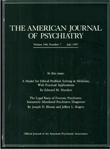Medical Illness Burden, Trait Neuroticism, and Depression in Older Primary Care Patients
Abstract
OBJECTIVE: The authors tested the hypotheses that medical illness burden is independently associated with depression and that this association is moderated by neuroticism. METHOD: Multiple regression techniques were used to determine the independent associations of medical burden and neuroticism with depression in a group of 196 subjects, 60 years of age and older, recruited from primary care settings. RESULTS: Medical burden and neuroticism were independently associated with major depression, depressive symptoms, and psychiatric dysfunction. CONCLUSIONS: These findings support models in which medical disorders may contribute directly to depression. At the same time, the role of neuroticism in later-life depression warrants further study. (Am J Psychiatry 1998; 155:969–971)



